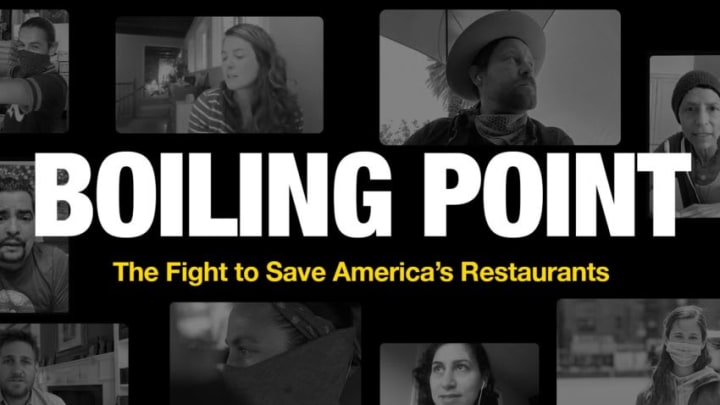Saving America’s restaurants is not just an industry concern, it has reached a boiling point.
Walking down a normally bustling restaurant area looks quite different. In Boiling Point: The Fight to Save America’s Restaurants, the short film conveys the far-reaching impact that closed restaurants have on the country as a whole. As other industries receive bail-outs and monetary aid, why do restaurants struggle to receive assistance?
This year has been beyond difficult for everyone. Whether it is the uncertainty of a virus that continues to impact every aspect of life to people’s reactions to the new “normal” that life presents, the desire to hide under the covers and wait till 2021 hits is great. Unfortunately, choosing to just not respond to difficult situations doesn’t make them go away. It just delays the inevitable.
While everyone understands the need to comply with health measures, the impact that the current crisis has on various industries is immense. Although many industries have vocal, influential spokespeople, the restaurant industry seems to be floundering in their approach to impact change. Even though the situation is at its boiling point, positive change seems to be beyond from anyone’s grasp.
In the recent short film, Boiling Point: The Fight to Save America’s Restaurants, many chefs, farmers and restaurant workers share their stories. Created by Life & Thyme, this film is meant to bring awareness not only to the restaurant’s industry’s plight but to show the connection between food and culture. This film isn’t a moment to just feel empathy for their plight. This film is meant to spark a willingness to be vocal and to act.
For many people, a dinner at their favorite restaurant is more than just a plate of food that satisfies a hunger. That time gathered around the table is about appreciating the moment. As many people have commented, food offers comfort in many ways. That universal language shared on a plate is a gift.
As some restaurants sit half-full or even empty, that place to gather has a decidedly different feel. It isn’t that chefs and restaurants do not want to throw open their doors in a welcome gesture. The parameters that will allow them to be that gathering place are an obstacle.
For many chefs and restaurateurs, the food industry is a passion. The long work hours often do not come with overflowing bank accounts. The independent restaurant owner often struggles to survive moment to moment. When tables sit empty, the opportunity to keep that kitchen open and running is lessened.
Although some chefs and restaurant industry groups are trying to bring change and find financial support during this current crisis, there is no single leadership point for an industry that is so far reaching. As seen in the Boiling Point film, the restaurant industry is more than just a chef, waitstaff and kitchen staff. From the farmers to the supply chain, the ripple effect of restaurants being closed is widespread.
One of the reasons why this film is important for everyone to see is that the makers discuss four different areas. It isn’t just the chef that you have seen on television talking about the struggles of keeping the doors open. It is the local farmer who is at the breaking point both financially and emotionally. It is the immigrant worker who has does not qualify for government assistance. It is the restaurateur who desperately wants to employ her staff but cannot seat enough guests to make it financially viable.
As other industries bend the ear of the entities who control the purse strings, the restaurant industry needs a stronger voice to unite all the groups that compromise the business. Although many people have tried to support their local restaurants in various ways, more needs to be done. Without a clear plan, the once growing restaurant industry may never recover.
For a moment, consider watching Boiling Point: The Fight To Save America’s Restaurants. Maybe if enough voices join together to make a unified plea, the restaurant industry can find a path to recovery.
Directed by Emmy winners Antonio Diaz and Stef Ferrari, who also serve as Executive Producers along with Nate Matteson, Hiro Murai (Super Frog), Christopher Storer, Hector Pacheco, and Brad Weston (Makeready), the film can be viewed on the Life & Thyme website.
Do you know someone in the restaurant industry who needs help?
